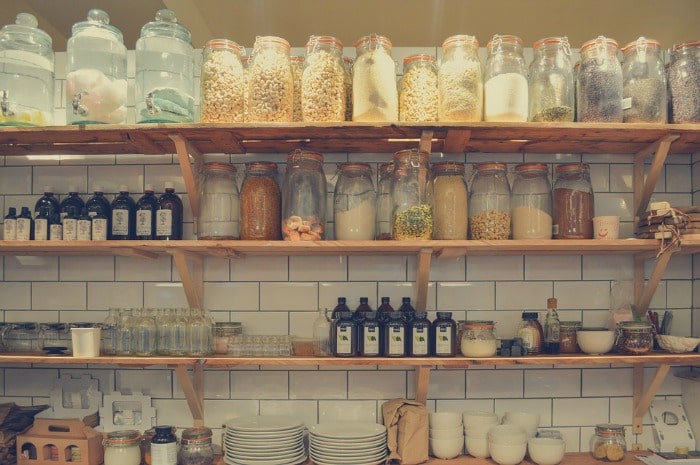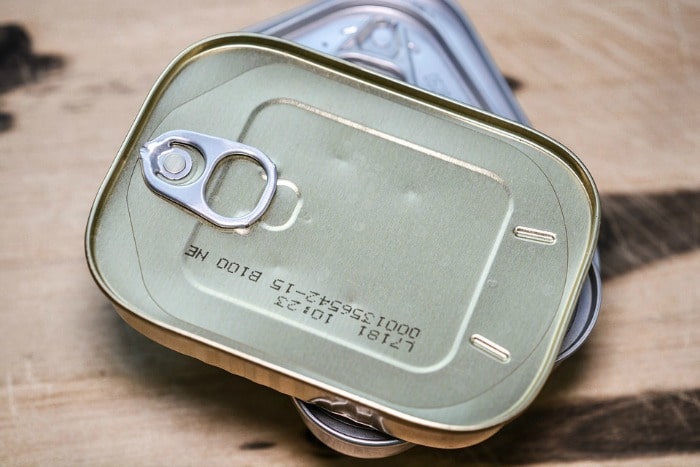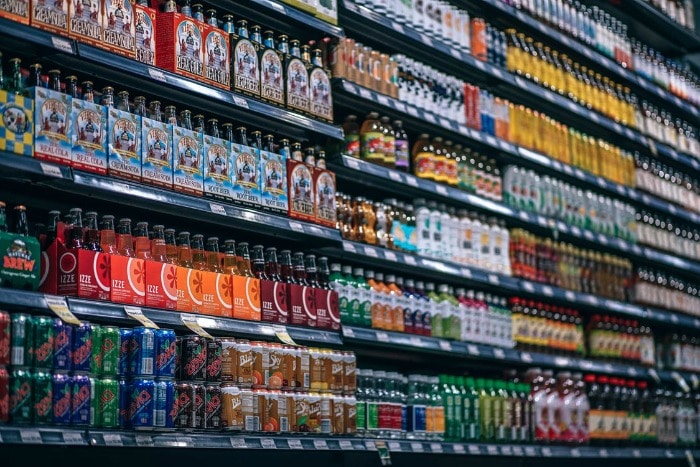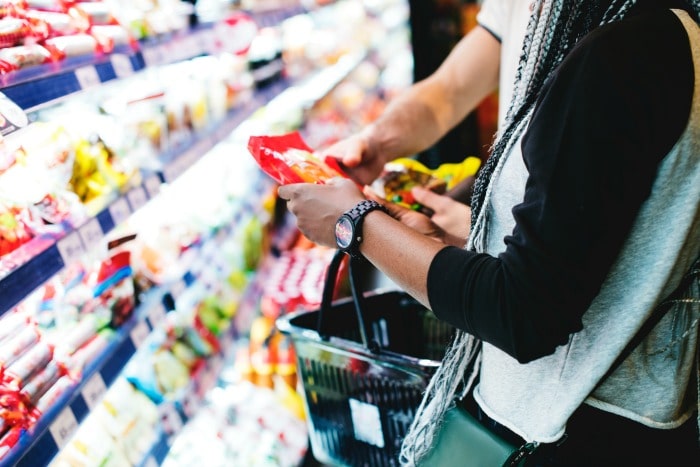Keeping a stockpile of food is a good idea for emergencies, whether it’s for a pandemic or a freak change in the weather.

Stockpiling food – it sounds like a thing from American TV shows like Extreme Couponing.
You see people with garages and cupboards stacked up to the ceiling with bulk bought products and coupons glitches.
Get a free £10 bonus with Swagbucks
Earn a bit of extra money in your spare time with surveys, videos, and simple tasks you can do at home.
New users can get a £10 bonus when they sign up.
Get the £10 bonus
The groceries stored could easily see some of these families through for years, but it’s not really true stockpiling.
Having an emergency stockpile of food is more about being intentional about the groceries you decide to keep for an emergency.
Why should you stockpile food?
Having a small emergency stockpile of food is quite a good idea.
If there is some kind of emergency, then you have a back up of supplies to see you through.
It could be any emergency; like there could be a freak snowstorm and you can’t get out of the house.
There are also times when the weather has affected the growth of UK veg. Heatwaves have caused there to food shortages on some vegetables, which has increased prices, in the past.
Or, if there is another kind of emergency that sees shops reduce the stock.
Even if nothing happens, an emergency supply of food can act as a back up if you’re a bit skint and can’t do a full food shop. Maybe you’ve had a cut in benefit payments, or you’ve lost your job, or there’s a massive bill, and it’s hit your usual budget.
While most people will have a few days worth of food in the freezer (when was the last time you actually checked what was in there?!), if you need food for a few more days it won’t last well.
What foods should I stockpile for an emergency?

You don’t want to be adding all foods to your stockpile as it would be a waste.
Foods with a short shelf like (think use by dates) won’t last too long so will be no good for an emergency supply.
You need to think about packet, tinned and frozen foods, that can’t easily be gotten to by bugs. Plus, consider non-food items like toilet roll, cleaning products and toiletries.
Getting a stockpile isn’t about buying your average weekly food shop then duplicating it by 2 or 5 or 10, or however many, weeks.
That wouldn’t get you food suitable to keep as a stockpile as a lot of it would go off.
You’ll also want to consider that if something happens that stops power, your fridge freezer will stop working.
Best foods to stockpile

What you need are staple store cupboard foods with a long shelf life.
Plus you want to have a mix of carbohydrates, protein, and fruits and veg.
You’re looking to get foods that give as much nutrition as possible.
- Pasta – high in carbs and stores well. Can be used in loads of different meals
- Rice – high in carbs and stores well. Can be used in loads of different meals
- Lentils – nutritious, easy to cook and a good source of protein
- Pulses – nutritious, easy to cook and a good source of protein
- Cereal/oats – avoid ones with processed sugars
- Beans – a good source of protein
- Canned meat
- Canned fish
- Canned veg – fulls of vitamins. Keep the liquid for stocks
- Canned fruits – get your vitamins.
- Dried fruits – last for ages and keep your fruit intake up
- Powdered milk – it may not taste great on it’s own but is good for oats.
- Soups – can be used as the base for other dishes
- Baking goods to make bread
- Nuts – for protein and fats
- Coffee and tea
- Herbs and spices – to help flavour foods
- Sweets – not just for a treat, good for a quick bit of energy.
- Bottled water – it’ll be clean
- Anything specific for kids under 2 years old, if you have kids
- Pet supplies, if you have pets
It’s probably best to avoid too many processed foods as they don’t as long shelf life so won’t keep well for longer periods of time.
You may also want to make sure you’ve got a trusty can opener as it’d be rubbish having all those cans and no way to open them!!
Non-food items
On top of food, it’s also useful to have an extra supply of other things too.
Consider getting extra:
- toothpaste – to keep yourself fresh
- soap/sanitiser – to keep hands clean and clean surfaces
- toilet roll – always handy!
- washing detergent – to keep clothes and bedding clean
- candles/flashlight – in case of a blackout
- basic medicines – to help with aches and pains, fevers, etc
- batteries – for your torch or other items
- bin bags – to tidy away waste
How do you work out what to stockpile?

You’ll need to work out how much of each item you’d need to buy. It’d be different depending on how many people there are in your home and how long you want your stockpile to last.
Most people are not used to cooking or making foods solely from dried foods, so it’s also worth researching some recipes in advance, so you know what to make. This research will help determine how big your stockpile needs to be.
A good place to start is by preparing a two-week meal plan, then just multiply the shopping list by how many weeks you’d need.
Don’t try to buy it all in one go! That’d be very expensive! You could just add a few items to your usual food shop and, over time, your emergency stockpile will start to add up nicely.
This will give you a chance to get the best offers and bargains.
Use apps like CheckoutSmart to get freebies and cheaper food, and check out any printable coupons UK so you can get more stuff for free!
Be sure to keep an eye on what you’ve got and rotate the stock every now and then to make sure everything is fresh.
This will also make sure you’re not wasting money with it just sitting there doing nothing.
Emergency stockpiling for a pandemic
In the event of a global influenza pandemic, things might not go as smoothly as they usually do.
It may be worth making sure you stockpile for a pandemic as basic items might not be available.
Obviously, if things get severe, other people could start “panic buying” which can see items sell out quicker, leaving shelves empty.
There may also be issues with getting supplies into the country so shelves cannot get refilled.
Also, in the event of things like viruses, it’s probably best not be in crowded supermarkets with other shoppers, so having some food and supplies at home can be a good idea.
Having a stockpile
We are not going to be stockpiling for a pandemic, or for Brexit, or for the freak snowstorm some of the papers say we’ll get every other week … well, not specifically.
However, we do already have a small amount of staple foods in our cupboards to fall back on – so I suppose we already do stockpile some foods and toiletries.
We were super-skint a few years back and never want to run out of food again.
We make sure to keep stocked up on basic foods that we can make an easy meal if we run out of fresh foods – for whatever may happen.
Saved a few quid with our tips?
If Skint Dad has helped you spend less or feel more in control of your money, you can support the site with a small contribution.
- I was sent a fake HMRC tax notice. Here’s how to spot the scam - 8 January 2026
- A once-a-year money check most families forget (with rough savings) - 6 January 2026
- The January bills reality check: the traffic light method that works - 1 January 2026

Jan says
I have around 3 weeks eorth of tinned/dried food in. Friends made fun of me until last Christmas/New Year when i was ill and couldn’t get out for 3 weeks. I didn’t have to worry as i had food in and my friend brought milk once when i needed it. They didn’t make fun of me after that but saw the sense as i live alone.
Karen Vaughan says
I always got laughed at too until that ‘Beast From The East’ was on peoples doors and the it was “stay at your grannies because you’ll get fed there” lol. My mother never knew when her husband was drinking his wage and she had three children to feed so she drummed it into us the importance of keeping an ’emergency cupboard’ that contained everything from food to toiletries. So I didn’t think anything of it really. But I always seemed to be the butt of jokes!! They soon changed their tune when that storm hit and they couldn’t get food for love nor money lol. THEN I suddenly became everyone’s hero lol.
You’re the survivor pet.
Good on you*
Dennis Harrison says
If you have children at home it isn’t just a good idea it is your duty. Try and think what it would be like having to provide food in such circumstances. Seriously, even if you are putting a couple of cans of beans per week, then it’s a start. Check for the furthest sell by date. Research, there is plenty of good advice on what to store.
Please, please, it’s far too serious an issue to have regrets, or shrug your shoulders and say “hindsight is a wonderful thing” being hungry isn’t!!!
Peace.